Having some hair breakage is normal as our hair is exposed to situations that are out of our control such as weather conditions. However, there are many things we can do to prevent it from escalating and becoming a serious issue. Transitioning hair is extremely fragile and needs to be handled with care now that you decided to go natural. Washing your hair can soon become the source of your woes and it’s important for you to know how to reduce hair breakage when washing transitioning hair.
Still, before listing the reasons why washing your hair can become the cause of your breakage it’s important you know the difference between breakage and shedding so you don’t start addressing an issue that doesn’t need solving. To identify if you have one or the other take a few strands of hair and have a look at them. If the majority of hairs you see have the root or white bulb attached to them then you have hair shedding which is normal. However, if you see short broken pieces of hair with split ends or knots and no root attached them you have hair breakage. If you want to know more about this subject read this.
Washing your natural hair can seem pretty straight forward, you just keep doing it as before you decided to go natural right? Well, it’s not that simple. The way you wash your hair, the products you use or how you handle it afterwards can have a direct influence on hair breakage. Let’s have a look at them.
Shampoo
Do you still use a regular sulphate shampoo? Those that give you all that white lather and leave your hair with that squeaky clean feeling? If you do you need to know that these remove all the natural oils in your hair making it dry and brittle. Once this happens the cuticle layers on your hair start to get chipped and then breakage creeps in. Because natural hair is naturally dry these effects can show themselves quicker, your best option to avoid this is to use a sulphate free shampoo or co-wash your hair (cleanse with conditioner). Read more about shampoo here or read 6 No Poo Shampoo Alternatives.
Hair Pile
If you normally pile your hair up in your head to wash it you are creating a great big mess. When doing this you are producing further tangles and single strand knots in your hair that will make your hair vulnerable and easy to snap or break under manipulation. Separate your hair in manageable sections and wash each section separately, this way you will avoid further tangles and knots. Read this article to get a few tips on detangling.
Brushing Your Hair While Wet
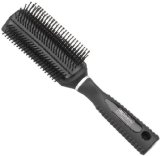 I am going to assume you don’t use a brush to detangle your curly hair when wet, because if you do you are creating stress on your hair. Wet hair can stretch up to 30% more, detangling with a brush will put extra stress on the hair which can make it snap or break. Add lack of elasticity and damaged hair and breakage will be very noticeable. Ideally, you should use your hands to detangle your hair or alternatively a wide tooth comb, but always use a good conditioner with a lot of slip to do this as it will facilitate your job and avoid unnecessary stress on your hair.
I am going to assume you don’t use a brush to detangle your curly hair when wet, because if you do you are creating stress on your hair. Wet hair can stretch up to 30% more, detangling with a brush will put extra stress on the hair which can make it snap or break. Add lack of elasticity and damaged hair and breakage will be very noticeable. Ideally, you should use your hands to detangle your hair or alternatively a wide tooth comb, but always use a good conditioner with a lot of slip to do this as it will facilitate your job and avoid unnecessary stress on your hair.
Cotton Towels
I’ve said this before in several other posts in here, but I will say it again. Cotton towels have the ability to snag, pull and break your hair. Most of us used them carelessly, and probably we all noticed a few hairs caught in them here in there. Using a cotton t-shirt or microfiber towel to dry your hair will avoid all this. It may be a small step, but it’s a step in the right direction. Read How To Transition To Natural Hair to get a few more tips.
Blow Drying
Using a blow dryer to remove excessive water after washing your hair might be a good option if you’re in a hurry and don’t want to leave the house with wet hair or if you want to style your hair with a diffuser for a wash and go. Nevertheless, blow dryers release dry heat which removes hydration from the hair. Preferably, you should let your hair air dry but if you need to use a blow dryer avoid using them excessively and use a low heat setting.
Are you guilty of some of these bad hair habits? What tips do you have to avoid hair breakage when washing your hair?

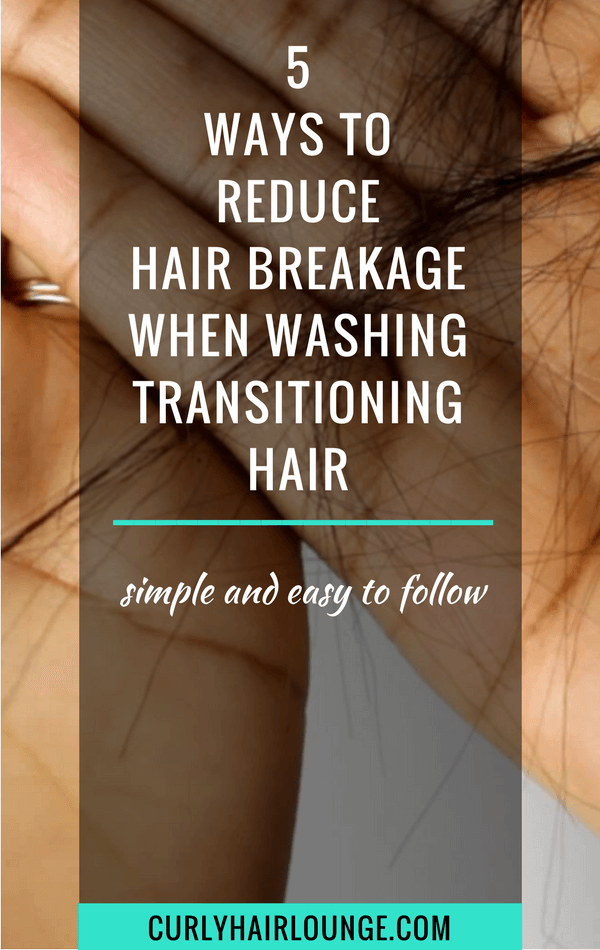
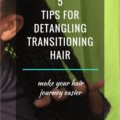
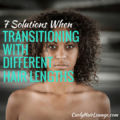
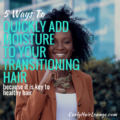
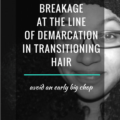
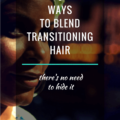
8 thoughts on “5 Ways To Reduce Hair Breakage When Washing Transitioning Hair”
My hair never really broke much ( or doesnt really break, that is) but that’s also because I don’t really look for it. Right now I have a buzz cut but use to have quite the longer bowl cut back in the day and I wouldn’t have toreally do anything to it and it was really healthy. But what is transitiioning hair? Is it like colored hair? And is there like a certain age where this will start happening to people?
Matt TheDopestMatrix
Hi TheDopestMatrix
Transitioning hair is hair that has stopped going through a chemical process that permanently changes its structure. In my case I stopped relaxing my hair to make it straight (more Caucasian like) and it is now growing curly while still having the relaxed ends attached. I’m transitioning from relaxed to my natural curly hair. This relaxed hair is very fragile and breaks easily if not properly moisturised. Also the use of regular shampoos with sulfates make it even more dry, so it’s good to avoid it.
Technically you can also say you’re transitioning when you have stopped coloring your hair – you’re transitioning from coloured/dyed/bleached hair. So, transitioning is a choice you can make whenever you want.
Hello Monica,
It seems like every time I read your articles, I learn something new. I didn’t know about the sulfate shampoo part can clean the oils in your hair. But then again, is that oil important? Just curious, how frequent should I was my hair? Because I shampoo it almost everyday
Hi Riaz,
I’m glad you learn something new every time you come here. The oil you take from your hair by using sulfate shampoos is important because it’s what protects your hair from the environment, give it it’s mechanical characteristics and prevents quick moisture release. Without it your hair becomes dry, dull, brittle and it will break.
Shampooing everyday is a necessity if you practice intense sports and sweat a lot or you swim everyday, you get my point. If this is not your case the more you shampoo your hair the more sebum (natural oil) will be produced and then you will wan to wash your oily hair, its a vicious cycle. Read this article.
Maybe just shampoo once a week and co-wash (wash with conditioner) the other days just, be sure to keep you hair moisturised. If you swim you need to use a clarifying shampoo every time you wash your hair to remove the chlorine. You should them follow with a moisturising deep conditioner as this shampoo is even more drying to your hair then regular sulfate shampoo.
This was an interesting article for someone who has no idea what “transitioning hair” is. Is that when you stop coloring your hair? It was enlightening to learn how to tell the difference between hair shedding and hair breakage. And I certainly didn’t realize that some shampoos contribute to hair breakage.
Hi David,
Transitioning hair is hair that has stopped going through a chemical process that permanently changes its structure. In my case I stopped relaxing my hair and it is now growing curly while still having the relaxed ends attached. This relaxed hair is very fragile. Using shampoos make any hair drier then it is, but it’s more of a problem for curly hair. If you wan to know more on shampoo read this article.
I’ve known about the ‘don’t brush your hair when it’s wet’ rule for a while, but I still tend to lose a LOT of hair when I wash it. I’m talking handfuls of the stuff, I’m amazed that I’m not bald to be honest!
From what I can tell these are usually due to hair shedding rather than breakage as they have the roots on them. I usually run my fingers through my hair when I’ve got conditioner on it to detangle, and that’s when most of the loss occurs! Should I skip this stage in future? Do you think this hair loss is related to transitional hairs?
Hi Jolie,
I’m glad to know you’re detangling with your fingers as it reduces the dreaded tangles and knots. It is generally acceptable to loose 100 hairs a day and if you wear your hair tied up all week, when you wash it those hairs will fall. So this hair loss you see is normal and not related to transitioning hair (hair that is growing naturally curly but still has its relaxed part attached). Having said this there are other factors that could affect hair loss. To know a bit more read this article. Always detangle your curly hair when washing it with plenty of conditioner don’t skip this stage, if you do you’ll be unable to work with your hair.